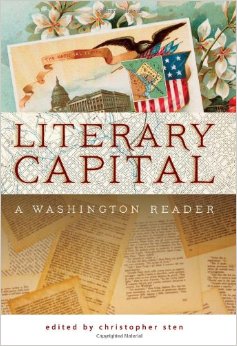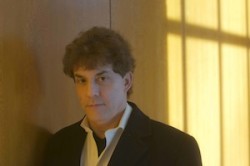Literary Capital
by Christopher Sten

Literary Capital: A Washington Reader
Edited by Christopher Sten
424 pp., University of Georgia Press
$32.95
Generally, New York has been recognized as the intellectual center of America, but Christopher Sten’s Literary Capital re-examines that theory in his anthology of 71 writers who visited or lived in Washington between 1800 and 2010.
Many appear to have viewed the city as rich and culturally satisfying. During the past 200 years, gaggles of people have flowed in: journalists, tourists, novelists, job hunters, celebrated writers Mark Twain and James Fenimore Cooper, and activists such as Frederick Douglass and Booker T. Washington.
At the turn of the 19th century, Abigail Adams, the second first lady, spent abbreviated visits in the nation’s capital, but she complained about the unfinished, unfurnished, drafty president’s house. It had no bells to call the servants, nor impressive places to shop, “even in the nearby village of George Town.”
Frances Trollope, mother of novelist Anthony, traveled from Europe with great anticipation. In her 1832 “Domestic Manners of the Americans,” she wrote, “I was delighted with the whole aspect of Washington; light, cheerful, and airy, it reminded me of our fashionable watering-places …”
Meanwhile, Charles Dickens and Alexis de Tocqueville also showed, briefly, as would Herman Melville. The novelist was expecting to receive a political appointment, but it never materialized. Instead, he satirized Congress in “Mardi, and a Voyage Thither.”
During the middle of the 19th century, Ralph Waldo Emerson, John Greenleaf Whittier, and William Wells Brown published and preached vigorously in favor of abolition and against the overt and legal District of Columbia slave trade.
In the midst of the Civil War, Louisa May Alcott arrived to tend to the injured, while Walt Whitman labored diligently as a hospital nurse. He kept copious journals, befriended Abraham Lincoln, and witnessed his death. He wrote, “And in the midst of that night-pandemonium of senseless hate, infuriated soldiers, the audience and the crowd—the stage, and all its actors and actresses … were the accompaniments of the death of President Lincoln. So suddenly and in murder and horror unsurpass’d he was taken from us. But his death was painless.”
Elizabeth Keckley, also accounted for in this compendium, was born a slave and eventually turned into the seamstress and confidante to Mary Todd Lincoln.
Dr. Sten, a literature professor at George Washington University, reminds us that after the war, African-Americans encountered a period of optimism: more freedoms, a better selection of job opportunities, and higher salaries.
Frederick Douglass, however, remained disillusioned with the District. As a capital, the location was below his standards:
“… I have no hesitation in saying that the selection of Washington as the National Capital was one of the greatest mistakes made by the fathers of the Republic …”
Then, in the 1890s Jim Crow — the new law of the land — upturned everything. During that reign of repression, the activist essayist Mary Church Terrell recalled her disquieting experiences in “What It Means to Be Colored in the Capital of the United States.” She wrote, “… As a colored woman I might enter Washington any night, a stranger in a strange land, and walk miles without finding a place to lay my head. Unless I happened to know colored people who live here or ran across a chance acquaintance who could recommend a colored boarding-house to me, I should be obliged to spend the entire night wandering about. Indians, Chinamen, Filipinos, Japanese and representatives of any other dark race can find hotel accommodations, if they can pay for them. The colored man alone is thrust out of the hotels of the national capital like a leper …”
Later, Sinclair Lewis, and Willa Cather turned up, as did Langston Hughes, who was “discovered” while working as a busboy at the Wardman Park Hotel.
Ralph Ellison and John Dos Passos also reached Washington, along with Allen Drury, Gore Vidal, Norman Mailer, and Ward Just.
By the 1970s, 1980s, and 1990s, the “muckrakers” had entered, too. Joseph Heller criticized the government’s ways in “Good as Gold,” Mary McCarthy reported about Watergate, and Joan Didion reprimanded politicians.
Dr. Sten also showcases a kaleidoscopic cluster of poets: Sterling A. Brown, Allen Tate, Archibald MacLeish, Elizabeth Bishop, Allen Ginsberg, Reed Whittemore, Denise Levertov, and May Miller.
This is the perfect book for a literature course or a devotee of Americana. Literary Capital illuminates an old Washington that is unknown to many. It deservedly rescues some authors from the edge of near non-remembrance.
 David Bruce Smith is the author of 11 books and founder of the Grateful American™ Foundation, which is restoring enthusiasm about American history for kids — and adults — through videos, podcasts, and interactive activities.
David Bruce Smith is the author of 11 books and founder of the Grateful American™ Foundation, which is restoring enthusiasm about American history for kids — and adults — through videos, podcasts, and interactive activities.




